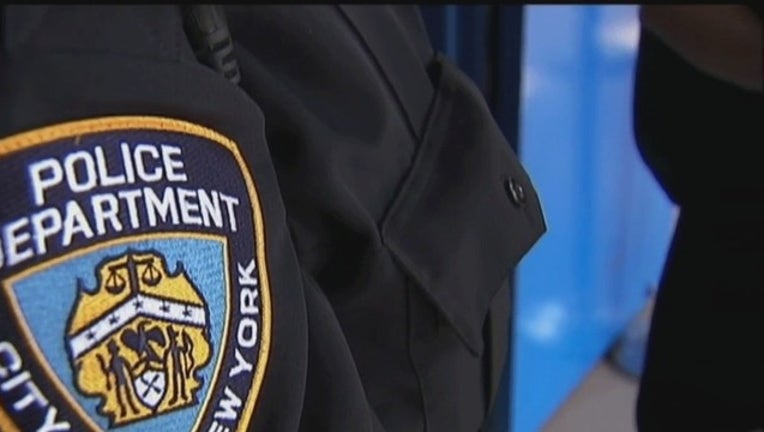NYPD moves to 'victim-centered' approach on sex crimes cases

NEW YORK (AP) - Two of the most concrete changes in the New York Police Department's evolving approach to sex crimes sit some 20 feet apart, flanking the lobby of a century-old Bronx police station that was known in the neighborhood's more turbulent years as "Fort Apache."
The first is a new waiting room, furnished with couches, children's toys and a radio playing soothing music. It's designed to give victims of sexual violence a momentary oasis away from the building's usual hustle and bustle before they meet with investigators.
The second is a private interview room where detectives from the department's revamped Special Victims Division talk one-on-one with victims, giving them more privacy than where they often used to meet: the detective's desk in the middle of a noisy squad room.
"When you come into this space, it doesn't feel police-y, for lack of a better word," Deputy Chief Judith Harrison, the commanding officer of the Special Victims Division, said in a recent interview. "It doesn't feel like your typical police station. It's a comfortable space."
The physical changes come as the police department embraces what Harrison calls a "victim-centered" approach to sex crimes. The new philosophy follows concerns raised in a watchdog report last year that the NYPD had lost the trust of victims.
Other changes include adding several dozen more investigators, retraining staff and, starting this week, shifting how rape statistics are reported to the public.
The new approach means conducting accurate, thorough investigations and arresting perpetrators, Harrison said, but also helping victims with counseling and other services that can help them get their lives back in order and give them some of the control that has been taken from them.
It means starting off by believing victims, using interview techniques that are meant to be more compassionate and understanding than typical questioning, Harrison said, and allowing victims to move through investigations at their own pace.
If a victim doesn't want to meet with detectives on a particular day to look at mugshots, for instance, detectives won't pressure a victim to do so, Harrison said. Instead, those investigators can pivot to other work, such as reviewing DNA results, looking at potential video evidence or interviewing other witnesses.
"The focus has to be on the survivor," she said. "The survivor is coming forward to report what is probably the most heinous thing that's happened to them. The worst thing that's happened to them. And when they're coming forward to report, they're showing a tremendous amount of strength and a tremendous amount of courage."
Carrie Goldberg, a New York City lawyer representing victims of sexual violence, said she was encouraged by the strides the Special Victims Division has made under Harrison's leadership.
"Just two days ago, we had a two-hour long client interview with an amazing detective from the SVD and our client, a rape victim, felt heard and seen," Goldberg said.
"The issue here in New York is that you can have the most amazing cops and detectives - and I've worked with some amazing ones - but if you don't have prosecutors willing to bring the charges and indict, victims will never see justice."
Another part of the department's evolution on sex crimes involves its weekly crime statistics report. Starting Wednesday, the department is adding a section listing the number of rapes in the city as counted under the national standard in the FBI's Uniform Crime Reporting system.
The FBI's definition includes vaginal, oral and anal penetration, regardless of gender. The statistical reports, known as CompStat, will also continue to separately list tallies for rapes as defined by state law, which only includes vaginal penetration.
Mayor Bill de Blasio pledged to make the change in May after the television network Newsy reported that the police department's rape numbers appeared 38% lower when using the state standard.
Last week, for example , the NYPD reported 63 rapes under the Uniform Crime Reporting standard and 43 under the state standard.
"Now we're aligning with national standards, national reporting practices and we're being transparent with our numbers," Harrison said. "And that comes from us just listening to people, listening to advocates and listening to survivors."
Harrison, a 22-year member of the NYPD, became the first black woman to lead the Special Victims Division when she was appointed last November after a city watchdog's report showed the unit's caseload had ballooned by 65% since 2009, while staffing levels remained nearly unchanged.
Harrison replaced Michael Osgood, who had been asking for more detectives and additional training, but whose final weeks were marred by allegations that a detective had compromised part of a pending sexual assault case against movie producer Harvey Weinstein.
Following the Department of Investigation's report in March 2018 the NYPD pledged a "top-to-bottom scrub" of the Special Victims Division and transferred about three dozen investigators into the unit. It also freed up about a dozen more to handle cases and made it a requirement that unit detectives investigate all felony sex crimes.
In February, the NYPD said it was adding about another three dozen more detectives to investigate sex crimes, including 15 handling cases involving adult victims and 16 handling cases involving child victims.
The police department, criticized in the Department of Investigation's report for re-traumatizing victims and jeopardizing prosecutions, also accelerated a program to train all special-victims investigators in the specialized interview techniques, known as trauma-informed questioning.
The report also included recommendations to remodel police facilities to make victims more comfortable, as with the private waiting and interview rooms.
"I see drastic improvements," Harrison said. "I see a department that's dedicated to improving to being the best they can be and that means making the necessary changes, and I see us making those changes."
__
Follow Michael Sisak at twitter.com/mikesisak
__
Send news tips, documents and recordings to AP securely and confidentially: https://www.ap.org/tips

